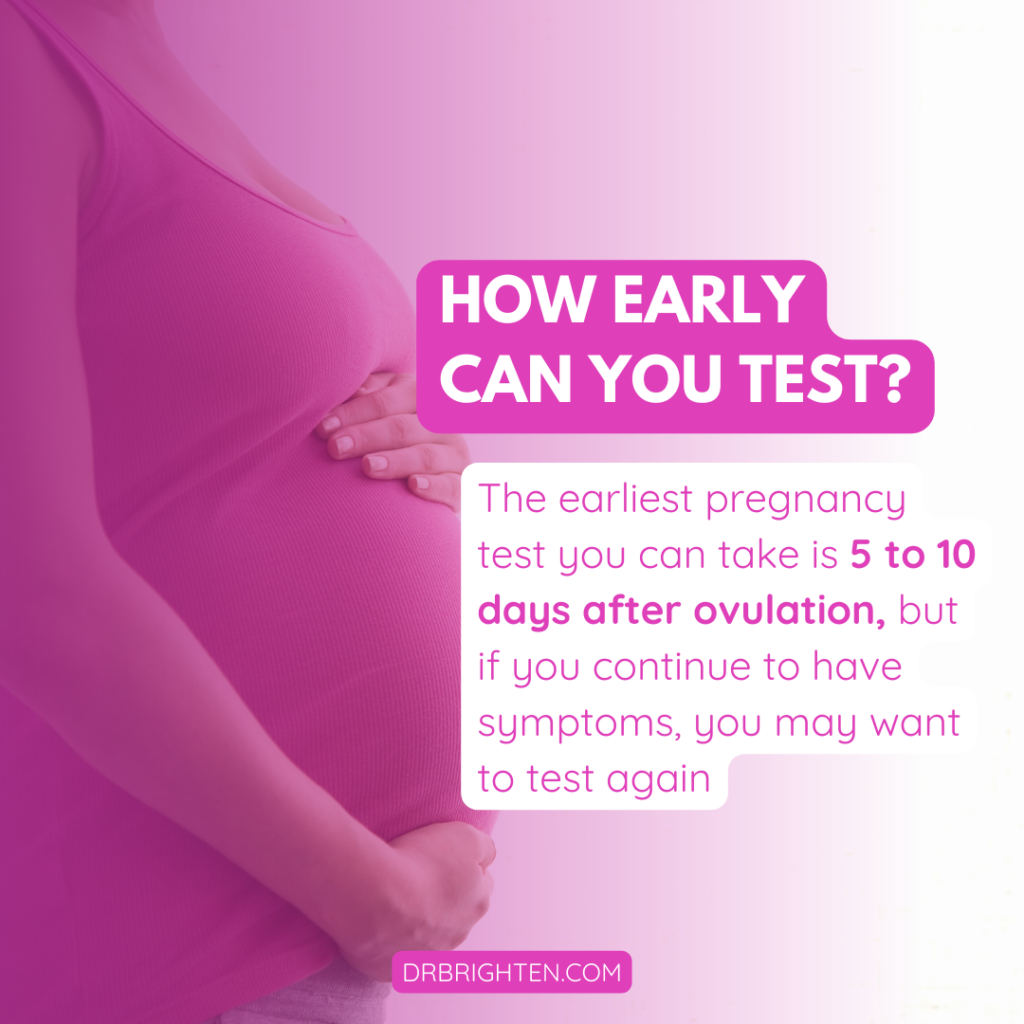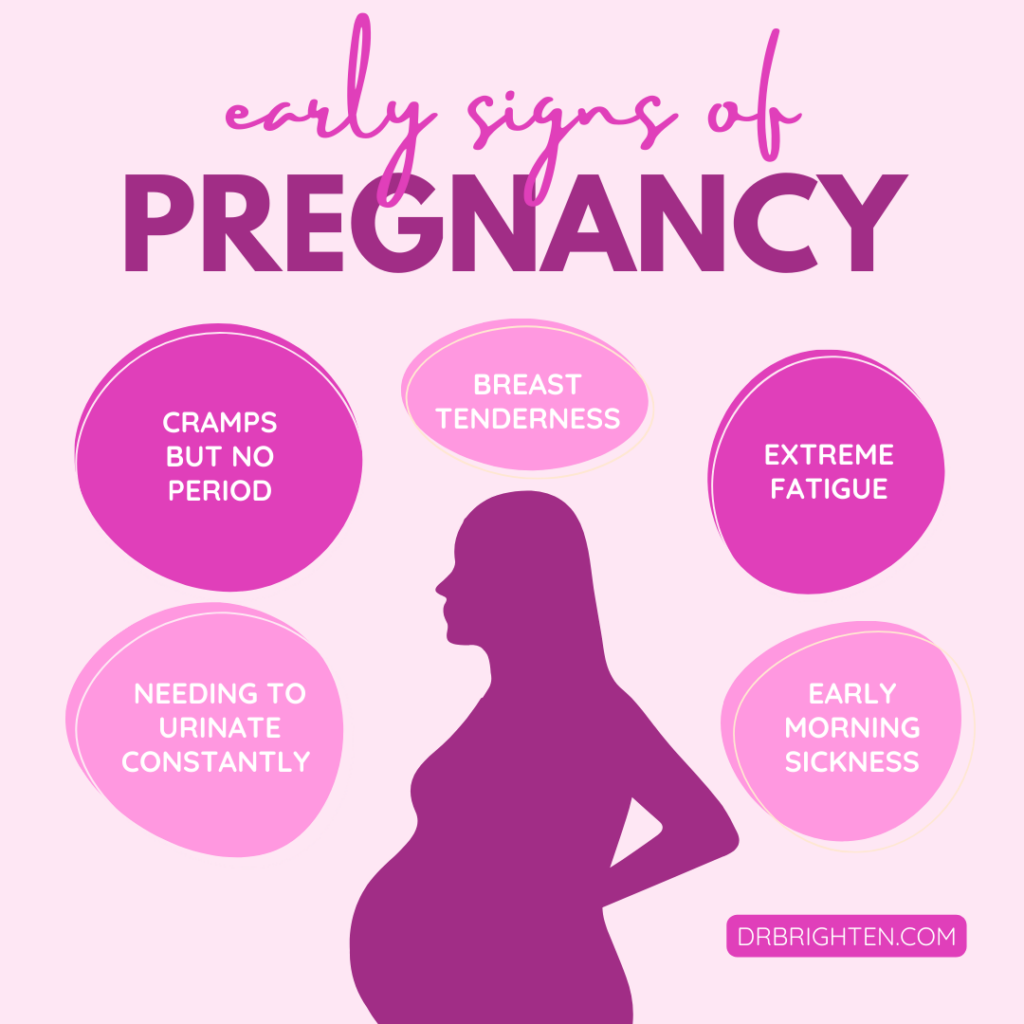The anticipation of finding out whether you are pregnant or not can be overwhelming. Whether planning a pregnancy or hoping to avoid one, your body sometimes tells you something's up before you can test.
Pregnancy symptoms can start as early as two weeks after conception, and many women experience at least some of them before they take a pregnancy test. Still, the symptoms aren't always as obvious as you might think.
Plus, if your cycle is irregular, you may not even be sure when you ovulated, making it difficult to know when to take a pregnancy test.
Knowing what to look for, plus the right time to take a test can help you feel more confident about what's going on in your body. Here's what to know.
In this article:
How Soon Is Too Soon to Take a Pregnancy Test?
A pregnancy test can usually detect pregnancy about 5 days before your expected period or when your period is supposed to start. If you're tracking ovulation, the earliest a pregnancy test can be taken is generally 6-7 days past ovulation (DPO).
The process of fertilization to implantation can vary from person to person, so sometimes, it can take longer to detect. This is why the general recommendation is 6-12 DPO to take a test. To understand this, let's do a quick reproduction 101 recap.
During ovulation, you release an egg from your ovary. The egg is then captured by the fimbriae of the fallopian tube (little finger-like projections) and then swept into the tube where it has the opportunity to meet sperm. If fertilization occurs, the egg will spend about 5 days maturing and traveling the fallopian tube before reaching the uterus.
Once in the uterus, a viable embryo will implant on the uterine wall, leading to pregnancy. It takes time for the embryo to burrow into the wall of the uterus and begin secreting hCG (more on this soon).
Ovulation usually happens mid-cycle, about two weeks before your period, but it can vary from month to month and even from woman to woman. While many people are told we all ovulate on day 14 every cycle, this simply isn’t true. You may ovulate on day 10 or day 21, just depending on your cycle, current health, and life factors like stress. But in general, it is usually consistently around the same handful of days within each person’s cycle.
If you have irregular cycles or aren't sure when you've ovulated, you may need to wait a bit longer for an accurate result. Or in other words, don’t write off the possibility of being pregnant based on one negative on a home test.

Pregnancy Tests and HCG Levels
So how exactly do pregnancy tests work, and what do they measure? Pregnancy tests detect a hormone in your urine called human chorionic gonadotropin1 (hCG).
HCG is generally only present when you're pregnant (there are very rare other conditions, but for the purpose of this article, we are focusing on pregnancy). It's primarily made by the placenta to increase progesterone2 levels for pregnancy.
If you recall from other articles, after ovulation there is a temporary hormone producing structure called the corpus luteum in the ovary. It is responsible for producing progesterone. Without hCG it stops producing progesterone after about 12 days. It is hCG’s job to keep that structure producing progesterone until the placenta is ready to take over.
HCG levels double every two to three days in early pregnancy. If you take a pregnancy test too soon, you may not have enough hCG in your urine for the test to detect pregnancy. You may have to wait 2-3 days to test again.
Remember, the embryo has to make it to the uterus, then implant, and finally begin secreting hCG into mama’s blood stream for you to be able to detect it in your urine. The whole process could take 7-10 days, which is why I tell patients that day 9 DPO may be the most economical day to test for pregnancy (seriously, those tests can add up).
The hCG level3 in your urine increases as your pregnancy progresses until around 10-12 weeks, when it levels off for the rest of your pregnancy and the placenta takes over.
Early Pregnancy Symptoms – Signs Before Missed Period
For many women, a missed period is the first sign of pregnancy, but there are other early pregnancy symptoms to look out for as well.
You've Got Early Morning Sickness
Calling it morning sickness is a bit of a misnomer because it can happen at any time of day. Morning sickness can vary in severity. Some people just feel a bit nauseated, while others will actually throw up. Very severe cases are known as hyperemesis gravidarum4 and sometimes require hospitalization.
It's not exactly clear what causes morning sickness5. It may be due to hCG, estrogen, or progesterone coupled with all the changes happening in your body.
Morning sickness usually starts around the fourth to sixth week of pregnancy and goes away by the end of the first trimester, but some women feel it much earlier and/or can have it last longer.
Your Breasts Are Tender
If you've ever had tender breasts near your period, you know that please steer clear of my chest feeling where even wearing a bra can cause discomfort.
For some women, this feeling starts even earlier in pregnancy—as early as a week or two after conception. This can be one of the earliest signs of pregnancy. You may even notice you need a bigger bra.
You can thank progesterone and estrogen for tender, swollen breasts as the body prepares for lactation (even if you have no plans to breastfeed). Sometimes the tenderness mellows out by the second trimester, but tender breasts can also continue throughout pregnancy.
You've Got “I Need to Lie Down Right Now” Level Fatigue
Feeling tired all the time is one of the most common early pregnancy symptoms, and I'm not talking about feeling a little run down. It's more like suddenly needing to nap in the middle of the day or being so exhausted that you can barely keep your eyes open.
Once again, this can be chalked up to pregnancy hormones (looking at you progesterone). As pregnancy goes on, it can also be caused by the simple fact that your body is working overtime to support your pregnancy.
Blood volume6 doubles (on average) during pregnancy, so your heart works double time to pump all that extra blood. On top of that, your body is also working hard to support the growing placenta and fetus.
All this extra work can leave you feeling exhausted, even if you're getting a full night's sleep. Fortunately, this fatigue usually goes away in the second trimester.
If you do feel extremely tired, it is worth discussing with your doctor because depending on other symptoms, it could be pointing towards iron deficiency anemia or thyroid disease.
You've Got Cramps but No Period
Many women experience cramps early in pregnancy, but they're not like the period cramps you're used to. When the embryo attaches to the uterine wall it is secreting enzymes to break down your tissue so it can make its way in. This can certainly cause cramping and even low back aches.Hormone shifts can also cause bloating that may feel like the type you get right before your period.
Later on, these pregnancy cramps are usually caused by the stretching of muscles. While cramps can be normal (and let's face it, aches and pains can be pretty common as pregnancy progresses), it's always a good idea to reach out to your doctor to double-check everything is okay.
You Notice Implantation Bleeding
Although it sounds a little scary, bleeding during the first trimester7 is very common and doesn't necessarily mean something is wrong.
One reason for early spotting or bleeding is known as implantation bleeding. Implantation bleeding sometimes occurs when the fertilized egg implants in the lining of your uterus, about 6-12 days after ovulation, so for many people, it's right around the time you'd usually have a period.
Some women experience implantation bleeding, while others either don’t get it or don’t notice it.
For many women, implantation bleeding is very light and lasts for a few hours or days. Still, if you have irregular periods or are unsure when you ovulated, it can be easy to mistake implantation bleeding for your period.
You need to pee all the time
Up all night taking bathroom breaks? Pregnancy can cause a major increase in the need to urinate. This is due to hCG and increased blood flow, making you feel the urge to go more often.
The problem is exacerbated by the fact that your uterus is growing and putting pressure on your bladder. As your pregnancy progresses, you'll find that you have to go even more often as the pressure increases (fun!).

Is It Normal to Miss a Period but Not Be Pregnant?
It is possible to miss a period but not be pregnant. This can happen for several reasons, including stress, changes in your diet or exercise habits, or conditions like polycystic ovary syndrome (PCOS). But heads up—not getting your period for any reason other than pregnancy calls for a visit with your healthcare provider.
What Are the Chances of a False Positive Pregnancy Test?
A false positive pregnancy test is when a pregnancy test says you're pregnant, but you're not actually pregnant. It's rare to have a false positive (home pregnancy8 tests are 97 to 99 percent accurate), but it could happen.
There are a few different reasons for a false positive pregnancy test, but the most common is that the test is sensitive to hCG, the pregnancy hormone, and can pick up small traces of it in your urine even if you're not actually pregnant. So if you've had a recent miscarriage or abortion, small amounts of hCG could still be present.
Other reasons9 could include certain health conditions, user error, or ectopic pregnancy (a serious condition where implantation occurs outside the uterus and needs medical attention).
If you think you may have a false positive pregnancy test, the best thing to do is take another test in a few days or visit your doctor for a blood test. Blood tests are more sensitive to hCG and can confirm a pregnancy earlier than a home test.
When to See a Doctor When Pregnant
If you're experiencing any early pregnancy signs, the best thing to do is make an appointment with your doctor. They can confirm whether you're pregnant with a blood test and give you information on what to do next.
Your doctor can also answer any questions about pregnancy and ensure you take a prenatal vitamin.
Regular visits with your OB or midwife are super important throughout pregnancy to keep you and your baby healthy.
Key Takeaways
- Early pregnancy symptoms can sometimes be confused with other conditions or the start of your period.
- Implantation bleeding, cramping, increased urination, morning sickness, or tender breasts could all be early pregnancy signs.
- The earliest pregnancy test you can take is 5 to 10 days after ovulation, but if you continue to have symptoms, you may want to test again.
- If you're still unsure, make sure to visit your doctor for a blood test or to rule out any other possible causes for your missed period.
References
- https://medlineplus.gov/lab-tests/pregnancy-test/ ↩︎
- https://www.ncbi.nlm.nih.gov/books/NBK532950/ ↩︎
- https://www.ncbi.nlm.nih.gov/books/NBK532950/ ↩︎
- https://www.acog.org/clinical/clinical-guidance/practice-bulletin/articles/2018/01/nausea-and-vomiting-of-pregnancy ↩︎
- https://www.ncbi.nlm.nih.gov/pmc/articles/PMC3676933/ ↩︎
- https://www.ahajournals.org/doi/10.1161/circulationaha.114.009029 ↩︎
- https://www.ncbi.nlm.nih.gov/pmc/articles/PMC2828396/ ↩︎
- https://medlineplus.gov/lab-tests/pregnancy-test/ ↩︎
- https://www.ncbi.nlm.nih.gov/books/NBK532950/ ↩︎
